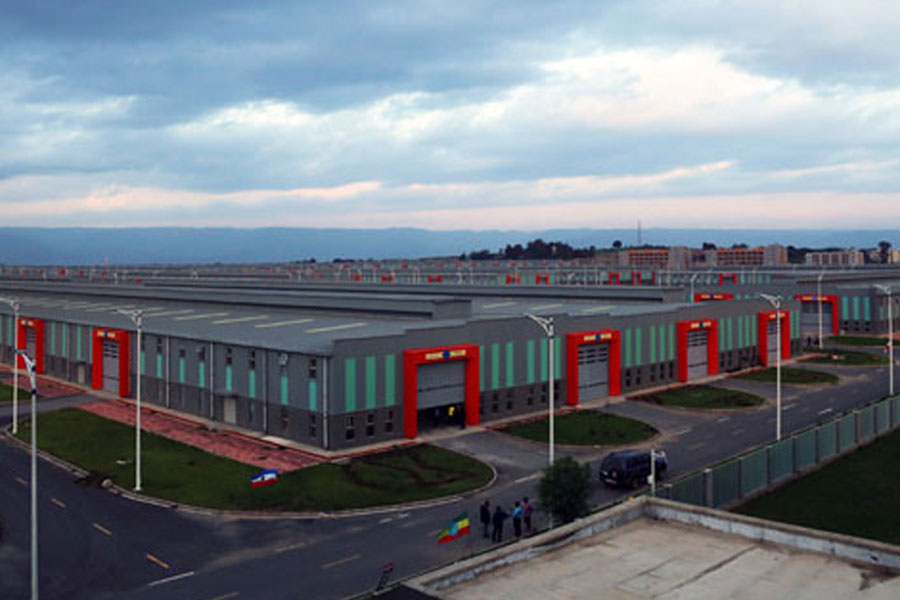
In an expansive land of the manufacturing sector, a troubling narrative unfolds as the industry is met with multifaceted challenges, jeopardizing the livelihoods of thousands and undermining the country's economic stability. The suspension of Ethiopia from the African Growth & Opportunity Act (AGOA) in January 2022, a consequence of the protracted conflict in Tigray, emerges as a pivotal moment triggering a cascading series of setbacks for the once-thriving textile manufacturers.
The aftershocks reverberate through industrial parks, with Hawassa Industrial Park experiencing a significant workforce reduction of 16pc, impacting nearly 25,000 employees since the AGOA suspension.
Ethiopia has been trying to promote its export trade and reduce dependence on imports for more than half a century. Nonetheless, there is persistent rigidity in the structure of the foreign trade, export earnings were stagnant while imports continued ballooning. Low productivity within the economic sectors and dominance of unprocessed or minimal value additions have also kept the export earnings low.
Exports from industry parks fell by 24pc last year. The largest Hawassa Industrial Park sprawling at 140hcts located 285Km from the capital with nearly 60 sheds best suited for textile manufacturers, has taken a sharp blow since Ethiopia’s suspension from the African Growth & Opportunity Act (AGOA) in January 2022. Ethiopia’s textile manufacturers, who once thrived on exports to the US, were left to scramble for alternative markets.
Belay Michael, branch manager of the Ethiopian Investment Commission at the Park, revealed that most companies are merely surviving.
The challenges extend beyond geopolitics, with additional woes including disruptions to the vital trade route in the Red Sea due to Houthi militia attacks, exacerbating logistical complications for industry parks. Despite efforts by the Ministry of Industry to alleviate the situation by allowing factories to sell to local markets from industrial parks, progress remains elusive, and the Hawassa Industrial Park is operating at only 15pc of its export potential.
Manufacturing has underperformed for several reasons. Macroeconomic factors such as access to forex, industrial and FDI policy emerge as a common thread, crippling their operational capacities. Aklilu Wubet (PhD), president of Wegagen Bank, highlights the immediate impact of foreign currency shortages on manufacturers, particularly those heavily reliant on it for raw materials. He points out the liquidity crunch and credit cap, both of which significantly affect the sector's ability to operate smoothly.
According to Aklilu, although loans to the manufacturing sector have increased in recent years, they still fall short of meeting the sector's demand. While the central bank has initiated a three-year strategy to enhance macroeconomic stability by reducing inflation and bolstering foreign currency reserves, Aklilu suggests that the full realisation of these ambitious objectives may take time and faces various challenges yet to be addressed.
The sector has not been regarded as a top policy priority in the current regulatory overhauls at the National Bank of Ethiopia (NBE). While officials recognise the credit cap can impact the sector "It's for a greater cause," said Hanna Hailemariam, advisor at the central bank.
According to UNDP study findings, the predominant macroeconomic challenge confronting the industrial sector is the overvaluation of the currency coupled with a shortage of foreign exchange. It depicts an artificially overvalued currency that creates distortions in the economy, acting as a disincentive for domestic production as imported goods become comparatively cheaper.
The repercussions extend throughout the entire economic landscape. Microeconomic factors such as reliable utility supply water and proper taxation add to the issue. The government's efforts to expand tax revenue by 35 billion Br to 440 billion Br adds another layer of pressure, coinciding with tightened credit availability, security concerns, and foreign currency shortages.
Bekoji & Digalu Mountain Springs Plc, manufacturer of Bekoji bottled water, has faced a protracted dispute with federal tax authorities, resulting in the closure of its operations six months ago. The closure of the company after a decade of production has left 240 employees out of work.
The company was entangled in a four-year tax audit that revealed tax receivables amounting to 19 million Br. The audit occurred at a time when the company was already facing financial challenges, with loans drying up and the factory struggling to sustain itself. Adefris Kifle, a major shareholder and manager at the company, expressed regret about the timing of the audit and its exaggerated findings.
"We were forced to go out of business," he said.
Birtukan Girma, senior advisor at the Ministry of Revenues, contends that the majority of tax findings result from companies underreporting revenues and overstating expenses, actions that are discovered at a later stage. According to Birtukan, the existing framework has everything in place to conduct thorough audits. While acknowledging the possibility of minor technical errors during the audit process, she emphasised that the appeals process is in a position to address concerns and provide some relief.
"Sector-based manuals leave little room for speculation," she said.
The importance of addressing knowledge gaps, promoting transparency and strengthening the auditing infrastructure are indicated by experts for the effectiveness of the taxation system. Yohannes Woldegebriel, a veteran tax lawyer, sheds light on the significant discrepancies in tax assessments, attributing a portion of the issue to the disparity between what authorities consider tax deductible and what manufacturers assume is already accounted for.
"There is a serious lack of awareness for tax laws," he told Fortune.
He points out potential conflicts when companies sell at a loss, with auditors sometimes presuming nefarious activities in such scenarios. The lack of certified auditors within the authorities was also mentioned as an impediment by the expert.
Their struggle mirrors the plight of many facing working under capital constraints, extremely limited access to forex, and external shocks, which has led to the manufacturing sector's contribution to GDP declining to 4.6pc.
Individual companies, such as bottlers of Arki Water, SBG Industry Plc, share stories of operational struggles leading to layoffs. The bottler which can churn out 500,000 bottles daily when at full capacity, had been operating at 20pc. Dereje Terefe, deputy manager of SBG, revealed serious power outages that have undermined its output in addition to security issues.
"We've been trying to increase our market share," Dereje said.
Up north in the Amhara Regional State, where conflict has been escalating, over 30,000 workers are facing the brunt of conflict. One of them is Habtam Adane, a 28-year-old who has relied on a meagre monthly wage of 1,700 Br for five years, and faces unemployment just weeks before expecting her first child. The company she worked for in the Amhara Regional State, has downsized its workforce by 1,000 over the past two years due to challenges in maintaining exports to Mexico, the US and Germany.
As the sole breadwinner, her plight mirrors a broader crisis unfolding among Ethiopian manufacturers. Expressing her distress, Habtam highlighted the growing concern and uncertainty surrounding job opportunities in the region.
"I have been shaken to my core," she told Fortune.
The economic challenges faced by companies, leading to downsizing and closures, not only impact individuals like Habtam but also underscore the wider implications faced by businesses and industries in the area.
Huaxu Textile Manufacturing Plc, in Kombolcha town, is putting its operations and the jobs of its 350 employees at risk. The company, operating from a sprawling 13hct factory, has been teetering on the edge as it wrestles with obstacles in accessing the three million dollars required for monthly production, coupled with security issues impeding its distribution to domestic markets.
Elias Samuel, major shareholder of the company, recounted a distressing incident where he had to pay half a million Birr to an armed group to retrieve finished products during distribution a few months ago. The recurring issues, exacerbated by the conflict in Ethiopia's north, have persisted over the past two years. Elias highlighted a specific instance two years ago when 15 containers of raw materials vanished in the Tigray Regional State.
"We plan to leave the business in a few months," he told Fortune.
Improvements in this institutional framework could potentially enhance the efficiency and effectiveness of managing foreign investments in the country. Ethiopia Investment Bureau, chaired by the Prime Minister, serves as the highest investment policy-making body in the country while the Ethiopia Investment Commission is tasked with the day-to-day promotion and regulation of Foreign Direct Investment (FDI) projects.
Industry insiders recommend revisiting a practice from the previous regime where industry leaders engage in direct discussion with officials including the PM to address the underlying issues hindering the manufacturers' success.
The closure of almost 450 firms, out of nearly 5,000, in the past year underscores the need for addressing the issues, ranging from security concerns and tax challenges to financial constraints and operational difficulties. While the Ministry of Industry reports the reopening of 300 new manufacturers in the past year, with an additional 90 revived over the last six months, Tilahun Abay, head of Strategic Affairs acknowledges that security issues represent an external variable beyond the Ministry's control, emphasising their focus on "strategic problem-solving."
They plan to engage with factories facing closure due to tax issues. Zerihun Abebe, director of competitive export production, notes poor bookkeeping skills among manufacturers and acknowledges the need for improved auditing skills from tax authorities. Zerihun details a six-point strategy devised by committees from multiple federal agencies, identifying access to finance as a key issue exacerbated by underdeveloped business plans.
The need for the government to address problems rather than presenting an overly optimistic view that starkly contrasts with the on-the-ground realities was recommended by experts prioritising efforts to create peaceful conditions. Economist Atlaw Alemu (PhD) views several issues as stemming from deep-rooted political challenges rather than mere economic policy preferences. He points to systemic impediments in accessing crucial factors of production such as land and capital, highlighting these as longstanding issues exacerbated by security concerns.
"It's a vulnerable sector," he said.
Atlaw dismisses the notion that significant shifts in macroeconomic policies, such as foreign currency regimes or monetary policy, would be sufficient until substantial security improvements, leading to the removal of logistical hurdles, take precedence.
PUBLISHED ON
Mar 02,2024 [ VOL
24 , NO
1244]

Fortune News | May 27,2023

Radar | Apr 15,2023

Commentaries | Jul 30,2022

Advertorials | Mar 29,2024

Fortune News | Jul 17,2022

Radar | Dec 19,2020

My Opinion | Jun 21,2025

Commentaries | Jun 07,2025

Featured |

Fortune News | May 08,2021

Dec 22 , 2024 . By TIZITA SHEWAFERAW
Charged with transforming colossal state-owned enterprises into modern and competitiv...

Aug 18 , 2024 . By AKSAH ITALO
Although predictable Yonas Zerihun's job in the ride-hailing service is not immune to...

Jul 28 , 2024 . By TIZITA SHEWAFERAW
Unhabitual, perhaps too many, Samuel Gebreyohannes, 38, used to occasionally enjoy a couple of beers at breakfast. However, he recently swit...

Jul 13 , 2024 . By AKSAH ITALO
Investors who rely on tractors, trucks, and field vehicles for commuting, transporting commodities, and f...

Jul 12 , 2025
Political leaders and their policy advisors often promise great leaps forward, yet th...

Jul 5 , 2025
Six years ago, Ethiopia was the darling of international liberal commentators. A year...

Jun 28 , 2025
Meseret Damtie, the assertive auditor general, has never been shy about naming names...

Jun 21 , 2025
A well-worn adage says, “Budget is not destiny, but it is direction.” Examining t...